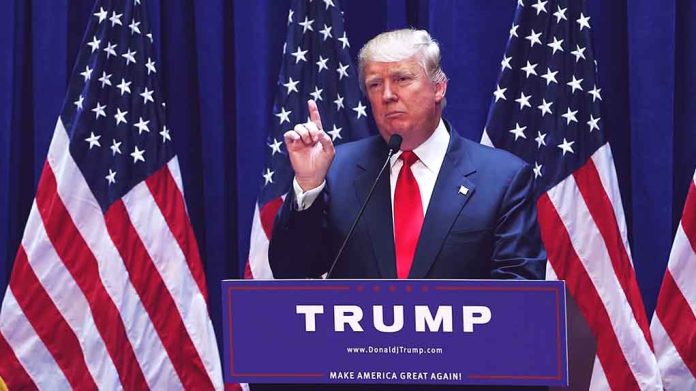
President Trump’s landmark Religious Liberty Commission defends American faith traditions against growing hostilities while prominent religious leaders and critics clash over its true purpose and impact.
Key Takeaways
- President Trump established the Religious Liberty Commission through executive order, appointing Texas Lt. Gov. Dan Patrick as chair and Dr. Ben Carson as vice-chair
- The commission will produce a comprehensive report on religious liberty threats and protection strategies before its scheduled end date of July 4, 2026
- Notable commission members include Cardinal Timothy Dolan, Pastor Franklin Graham, Eric Metaxas, and Kelly Shackelford
- The White House has simultaneously ordered the Justice Department to create a task force addressing anti-Christian bias
- Critics argue the commission may increase religious discrimination, while supporters believe it restores constitutional protections
Trump Establishes Powerful Religious Liberty Commission
President Donald Trump has taken decisive action to protect religious freedom in America by establishing the Presidential Commission on Religious Liberty through executive order. The commission, led by Texas Lt. Gov. Dan Patrick as chair and former HUD Secretary Dr. Ben Carson as vice-chair, will investigate threats to religious liberty and develop strategies for its protection. With a tenure set to conclude on July 4, 2026, unless extended, the commission represents a significant step toward restoring religious values in American governance and protecting faith communities from government overreach.
The commission’s distinguished membership includes influential religious and intellectual leaders such as Ryan T. Anderson, Cardinal Timothy Dolan, Pastor Franklin Graham, Eric Metaxas, and Kelly Shackelford. These appointees will examine a range of critical issues including First Amendment protections, religious exemptions to vaccine mandates, parental rights in education, and voluntary prayer in public schools. The administration has clearly signaled its intent to address what many conservatives see as increasing hostility toward traditional religious values in American society.
Defending America’s Religious Heritage
The executive order establishing the commission explicitly acknowledges the foundational role of religious freedom in American society. It states that religious voices are “integral to a vibrant public square and human flourishing” and that religious institutions should be “free to practice their faith without fear of discrimination or hostility from the Government.” This language directly confronts what many conservatives have experienced as growing government infringement on religious liberties, particularly during the previous administration’s COVID-19 restrictions on worship services.
“It shall be the policy of the executive branch to vigorously enforce the historic and robust protections for religious liberty enshrined in Federal law,” the order declares, setting a clear mandate for the commission’s work Standing for Freedom
Kelly Shackelford, president of First Liberty Institute and commission member, emphasized the importance of this initiative in restoring constitutionally protected religious freedoms. “For too long, government officials have been hostile to expressions of faith… It will be a privilege to do everything we can to protect religious liberty and restore our First Freedom for all Americans,” Shackelford stated. His comments reflect the frustration many religious Americans have felt as their values have been increasingly marginalized in public life.
Support and Opposition to the Commission
While announcing the commission, President Trump clearly articulated his vision: “We’re bringing religion back to our country. It’s a big deal.” This statement resonates with his strong base of support among religious conservatives, particularly white evangelicals. Pew Research Center polling shows Trump maintaining remarkably high approval ratings within this demographic, despite lower overall approval numbers. Their support reflects legitimate concerns about religious discrimination – the Public Religion Research Institute found that two-thirds of white evangelicals believe Christians face discrimination in America.
“Mr. President, I can’t tell you, first off, how proud I am to see religion coming back to the White House. God bless you,” said Dr. Phil McGraw at the commission’s announcement ceremony.
However, the commission has faced criticism from progressive religious leaders. Rev. Shannon Fleck claimed it would “do more to increase bullying in schools, workplace conflict and religious discrimination than it will to protect our constitutional rights,” while Bishop Dwayne Royster asserted that “religious freedom is not theirs to wield as a weapon of fear or domination.” These critics fundamentally mischaracterize the commission’s purpose, which is to protect religious Americans from being forced to violate their deeply held beliefs – not to impose those beliefs on others.
Historical Context and Broader Initiatives
The Religious Liberty Commission continues a tradition of presidential efforts to protect faith in American public life. Previous initiatives include Franklin Roosevelt’s expansion of military chaplains in the 1940s, the U.S. Commission on International Religious Freedom established under President Clinton in 1998, and President George W. Bush’s White House Office of Faith-Based and Neighborhood Partnerships. The Trump administration previously created the Department of Justice Religious Liberty Task Force in 2018, demonstrating a consistent commitment to religious freedom that continues with this new commission.
“Chaplains of the military and naval services and clergymen everywhere who by word and life are advancing the cause of idealism and true religion are doing a commendable work, one that is absolutely essential to the life of the nation,” Roosevelt stated, highlighting the long-standing American recognition of religion’s importance to national wellbeing.
In addition to the Religious Liberty Commission, the White House has ordered the Justice Department to establish a task force specifically addressing anti-Christian bias. Texas Lt. Gov. Dan Patrick expressed his commitment to the commission’s mission, stating: “We will carry out the president’s important mission to preserve and strengthen religious liberty in our country. I thank President Trump for his steadfast commitment to ensuring our nation returns to our founding principles of faith and religious liberty.” This comprehensive approach demonstrates the administration’s serious commitment to protecting the religious freedoms that have made America exceptional.




